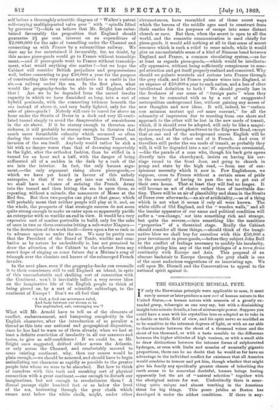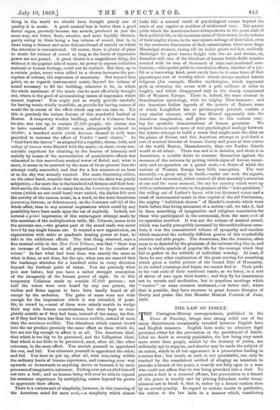THE GIGANTESQUE MUSICAL FETE.
IF only the Darwinian principle were applicable to man, it must surely sooner or laterproduce a new sort of human nature in the United States,—a human nature with sensoria of a greatly ex- tended grasp, telescopic as one may say, but with a diminishing insight into minute details, a loss of microscopic power. Suppose you could have a man with his crystalline lens so adapted as to take in a double or treble field of view, and his optic nerve so modified as to be sensitive to the intensest degrees of light, or with an ear able to discriminate between the shout of a thousand voices and the shout of ten thousand, or with a taste sensible to the difference between the higher altitudes of high venison, or with a smell able to draw distinctions between the intenser forms of sulphuretted hydrogen, or even with limbs and muscles of unusually gigantic proportions, there can be no doubt that he would so far have an advantage in the individual conflict for existence that all America would combine to honour and pet him, though whether that might give his family any specifically greater chance of inheriting the earth seems to be somewhat doubtful, human beings having apparently lost the art of "natural selection" together with the aboriginal nature for war. Undoubtedly there is some- thing quite unique and almost touching in the American thirst for big things. This peace jubilee at Boston has developed it under the oddest conditions. If there is any- thing in the world we should have thought purely one of quality it is music. A good musical box is better than a good barrel organ, precisely because the sounds, produced in just the same way, are lower, finer, sweeter, and more liquidly distinct, partly owing to there being a leas volume of sound, that is, to there being a thinner and more delicate thread of melody on which the attention is concentrated. Of course, there is plenty of place in music for volume of sound so long as the limits of expressive power are not passed. A great chorus is a magnificent thing, for without it the popular side of music, its power to express collective national or human feelings, could not be realized. But then, up to a certain point, every voice added to a chorus increases the per- ception of volume, the expression of unanimity. But beyond that point, or, as regards instrumental music, beyond the volume of sound necessary to fill the building, whatever it be, in which the whole sentiment of the music can be most effectively brought out, where is the good of accumulating causes of impression which cannot Impress? You might just as wisely provide carefully for having music wholly inaudible, as provide for having causes of music far in excess of the effect which any ear can take in. Yet this is precisely the unique feature of this wonderful festival at Boston. A temporary wooden building, called a Coliseum from its size, was run up, to contain 37,000 people ; the chorus was to have consisted of 20,000 voices, subsequently reduced to 10,000; a hundred anvils (with firemen dressed in red) were provided to increase the effect of Verdi's "anvil chorus." In "God Save the Queen" as adapted for a republic, drums, bells, and volleys of cannon were blended with the music ; in short, every con- ceivable expedient for climbing to the heaven of harmony and melody by means of the accumulation of quantitative effects was exhausted in this marvellous musical tower of Babel, and, what is more, it seems to be asserted by the mass of those present that the attempt really succeeded, and that for a few minutes or au hour or so the sky was actually reached. The more discerning critics, on the other hand, consider that the ascent to the skies was purely subjective, —far more due to the hundred red firemen and their hun- dred anvils, the vision of so many faces, the knowledge that so many voices (which no one could hear) were united, the elation felt over the novelty of the cannon music, in a word, to the mere fanaticism (swarming fervour, or Schwarmerei, as the Germans call it) of the whole affair, than to any musical impressions which could by any possibility have been made upon the ear of anybody. Indeed, our natural a priori impression of this extravagant attempt made by this musician of the multiplication table, Mr. Gilmore, seems to be the accurate one,—the greater part of the sound made was never heard by any single human ear. It wanted a new organization, an organization with cubic or quadratic hearing power at least, to take in the additional effects. The first thing observed, says a fine musical critic in the New York Tribune, was that "there was no increase of loudness at all proportioned to the number of voices." In fact what had been done was exactly the same as what is done, or not done, for the eye, when you are assured that the landscape stretches for a hundred miles in every direction beyond the furthest point of vision. You see precisely what you saw before, but you have a rather stronger conception of the incapacity of the human power of sight. So in this temporary Coliseum made to contain 37,000 persons ; not half the voices were ever heard by any one person, the violins and flutes appear to have been hardly heard at all except by the orchestra. The gates of sense were not wide enough for the impressions which it was intended, if possi- ble, to crowd in,—most of them were utterly unable to wedge their way into human consciousness, but were kept as com- pletely outside as if they had been, instead of too many, too few, as if they had been less than the minimum audibile, instead of more than the maximum audibile. The vibrations which cannot crowd into the ear produce precisely the same effect as those which do, but are not big enough to affect it at all. The American ideal, that which is too big to be perceived, and the Lilliputian ideal, that which is too little to be perceived, meet, after all, like other extremes, in the same effect. You stretch yourself to apprehend the one, and fail. You attenuate yourself to apprehend the other, and fail. You have to put up, after all, with remaining within the ordinary limits of human experience, and reasoning your way upwards or downwards to anything above or beneath it by mere processes of imaginative inference. No frog ever yet swelled himself out into a bull ; and no human being will ever be able to expand his sensuous experience by multiplying causes beyond his power to appreciate their effects.
There is a curious sort of simplicity, however, in this yearning of the American mind for mere scale,—a simplicity which almost looks like a natural result of psychological causes beyond the reach of any caprice or accident of misformed taste. The quaint pride which the Americans have always shown in the great scale of their political life, in the immense areas of their states, in the volume of their mighty rivers, in the vast square-mileage of their lakes, even in the enormous dimensions of their catastrophes, when some huge Mississippi steamer, racing till its boiler grows red-hot, suddenly discharges its great human freight into the air and stream, or, dismaller still, one of the bloodiest of human battle-fields remains covered with its tens of thousands of slain and mutilated com- batants,—this quaint pride in cumulative effects, whether of a joy- ful or a harrowing kind, must surely have in it some trace of that gigantesque sort of worship which almost always marked Asiatic religions (for example, Hindoo mythologies, which represent gods as churning the ocean with a pole millions of miles in height), and which disappeared only in the closely compressed life of Western Europe. There is, indeed, the same element in Scandinavian mythology, with its mighty Thor-hammer ; and the American Indian legends of the powers of Nature, some of which Longfellow has so picturesquely painted, contain a, very similar element, which has filtered apparently into the American imagination, and given rise to this curious crav- ing for symbolic demonstrations of human greatness. We suspect there is much more of real psychological analogy between the Asiatic attempt to build a tower that might scale the skies on the plains of Shinar, and this American attempt to peal forth a sort of musical thunder of human liberty and peace at that centre of the world, Boston, Massachusetts, than our Yankee friends would at all admit. There was and is in Asiatics, and there is in Americans, a notable desire to reassure themselves against the menaces of the universe by getting visible signs of human unani- mity and co-operation on a grand scale,—a desire of which the nations of Western Europe have little conception. The vast assembly,—a great army in itself,—under one roof, the signals, musical and unmusical, which centred all that assembly's attention at one and the same moment, the cry for country which went up with so enthusiastic a voice in the presence of the "hero-president," the rolling out of Luther's hymn with ten thousand voices and a crash of instrumental music in that capital of the old Puritanism, the mighty "hallelujah chorus" of Handel's oratorio which went forth before that living miniature of a nation—all, we take it, had in them something of imaginative and religious consolation for those who participated in the ceremonial, from the mere scale of co-operation involved. It was not the volume of musical sound, which was hardly perceptibly increased by the multitudinous num- bers, it was the concentrated volume of sympathy and emotion which reassured the radically diffident genius of this wonderfully creative and able people. The Americans, like the Asiatics, often seem to us daunted by the greatness of the universe they live in, and seek in visible symbols of popular life for the courage which they fail to gather in the solitude of individual worship. At least, if there be any other explanation of the great craving for something which gives a visible picture of the Grand Etre of Humanity, in its united yearnings and hopes, we cannot find it. Their pride in the vast scale of their continent reacts, as we fancy, in a sort of shiver of awe upon their hearts ; and they fly for reassurance not to reverie and meditation, but to populous meetings which " resolve " on some common sentiment,—or better still, where that is possible, they have recourse to great human liturgies of liberty and praise like this Monster Musical Festival of June, 1869.































 Previous page
Previous page